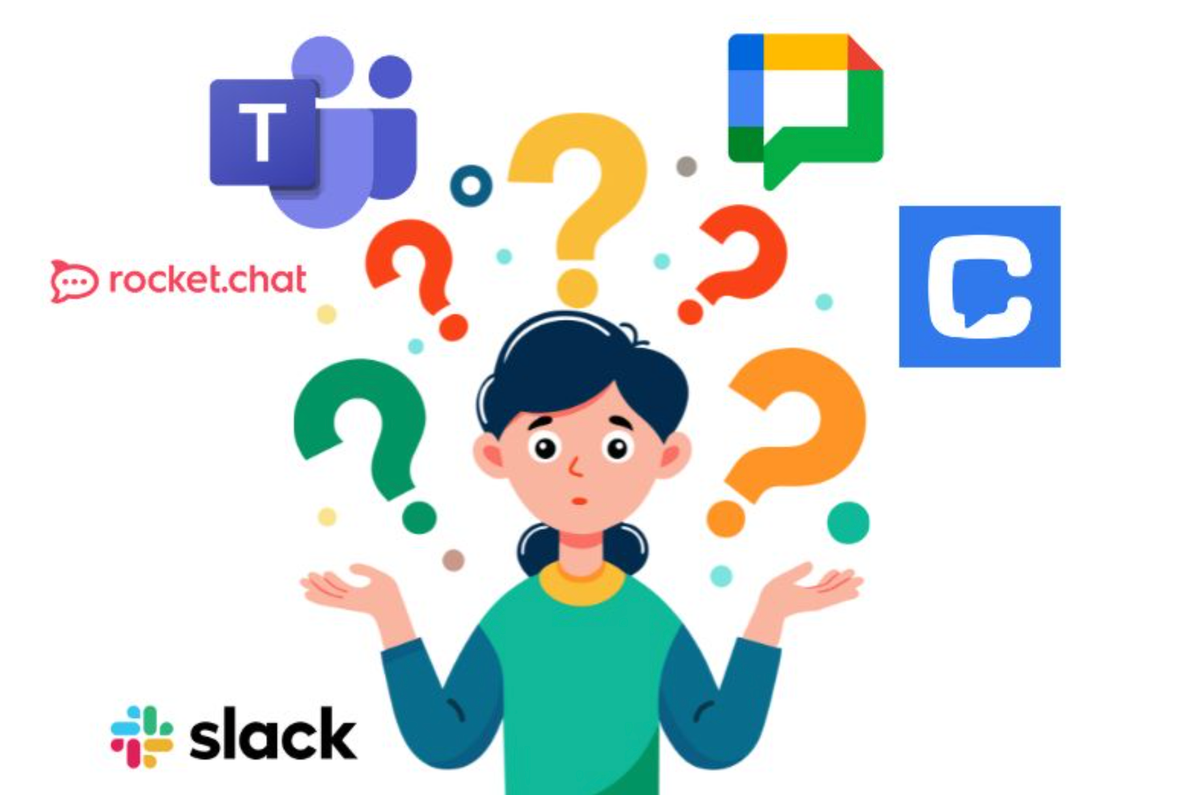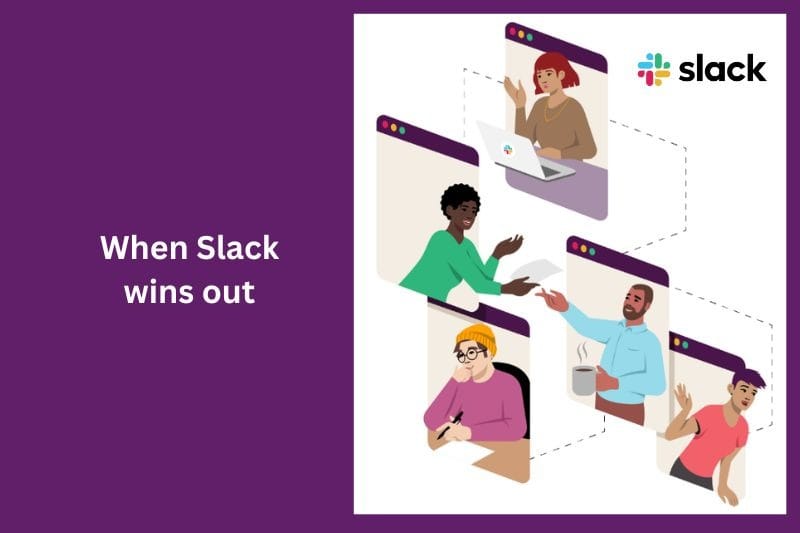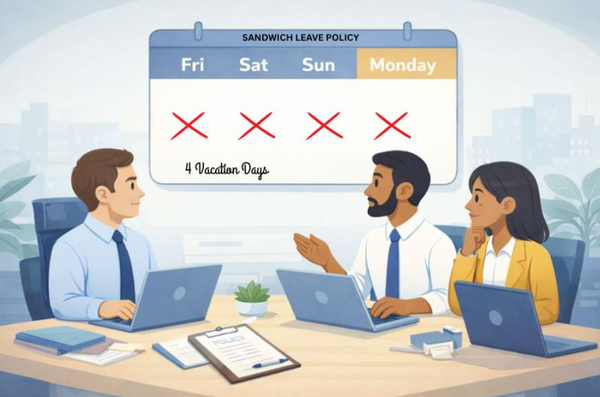Slack alternatives: Are they a good idea?
Thinking about switching from Slack? Check out Slack alternatives - Microsoft Teams, Google Chat, Chanty, and Rocket.chat, helping you make the right choice.

When Slack was launched in 2013, it quickly became the ‘go-to’ platform for team collaboration, direct messages, and group conversations. It was exciting to use and brought a level of integration into team communication rarely experienced apart from legacy CRM systems.
Then something changed. In 2021, as Salesforce acquired Slack the platform received criticism for security breaches, reactive development upgrades, and high costs. From this time, the search for Slack alternatives has greatly increased. [1]
The question is: Are these criticisms enough to look for other options, and how do the most popular alternatives really stack up? We get to the bottom of it, and look at what’s available when you no longer want to use Slack.
Quick Overview
If you’re considering a switch from Slack, you’ll find no shortage of alternatives. Platforms like Microsoft Teams, Google Chat, Chanty, and Rocket.chat each provide their own blend of video calls, file sharing, team chat capabilities, and collaboration features.
Table of Contents
Microsoft Teams

The short summary: If you already spend all your time in the Microsoft environment, then MS Teams is the alternative to Slack. It’s a natural progression towards integrated communication tools for MS-focused teams.
Why it works: With Teams already tightly integrated with Microsoft 365, you can easily move between MS Word, MS Excel, MS PowerPoint and MS Outlook without skipping a beat. Even if your team is in different geographical locations, as long as they use Microsoft, it will feel like you’re in the same office.
What can you do with MS Teams?
The key features that make MS Teams attractive for enterprises are:
- Individual and group instant messaging.
- Keep the entire messaging history indefinitely.
- Virtual meetings, video calls, and audit calls.
- File sharing and document collaboration.
- Creation of public and private channels to foster collaboration.
- Schedule meetings and video calls directly in Teams, and have them appear instantly in Outlook.
- Access all features on desktop or mobile for real-time communication.
Potential downside compared to Slack: MS Teams works best within the Microsoft environment, but apart from it, it can feel disconnected and complex for smaller teams that don’t use MS products. Also, 65% of Slack users are empowered to make strategic decisions from using Slack, vs 46% of Microsoft Teams users. [2]
Pricing:
- MS Teams Essentials - $4 per user/pm (paid annually)
- MS Enterprise - $5.25 per user/pm (paid annually)
- No free plan available
Google Chat

The short summary: If your everyday operations take place in Google Workspace, Google Chat provides the instant messaging and video chat interface that ties everything together.
Why it works: Google Chat (formerly Hangouts) is now powered by AI, making this application more powerful within the Google ecosystem. It’s included in Workspace at no additional cost and runs a number of third-party tools to improve your productivity workflow.
What can you do with Google Chat?
Google Chat is a solid Slack alternative within Workspace. It works well to consolidate internal communication, and its user-friendly interface makes it a popular choice for remote teams. Achieve the following with Chat:
- Keep track of internal communication with one-to-one conversations and group messaging.
- Keep track of communication with message history.
- Create a space within Chat to share team updates and collaborate, keeping everyone on the same page.
- Huddle with teammates for immediate problem-solving and urgent project updates.
- Share Google Docs, Sheets, Slides, and Gmail content directly from Google Drive.
- Tight security with the same malware and phishing protections afforded to other Google apps.
- AI-driven insights and assistance afford Google Workspace users the latest in seamless communication.
Potential downside compared to Slack: While Google Chat is one of the best in terms of team collaboration tools, there are potential downsides. Compared with Slack and MS Teams, it doesn’t offer advanced features such as workflow customization, and it does not have an unlimited messaging history, deleting messages after 180 days.
Pricing:
- Free version for all users with a Google account.
- Business Starter - $6 per user/pm (billed annually)
- Business Standard - $12.60 per user/pm (billed annually)
- Business Plan Plus - $22 per user/pm (billed annually)
Chanty

The short summary: Moving away from the big guns, we look at Chanty, which is a small but mighty team collaboration tool. Chanty’s Teambook allows you to stay organized and get access to your entire messaging history when you need it.
Why it works: Chanty offers an intuitive messaging experience that will look and feel a lot like Slack. But unlike Slack, it is easier to use and is more affordable for small teams. It includes video conferencing, voice messages, and team messaging.
What can you do with Chanty?
Chanty has a lot of the same features as Slack, and for distributed teams and small companies, you can look forward to the following:
- Create and manage messages in Teambook, sharing videos and innovative ideas with pins.
- Use a built-in task manager in messages to keep the entire team up-to-date with task and project progress.
- Optimize your workflow by switching to Kanban view.
- Keep only relevant people on messages and projects, and set user controls and privileges.
- Turn a simple team chat into a powerful business tool by adding third-party apps.
- Start a thread for context-based conversations.
- Send voice messages on the go to keep project deadlines and tasks rolling.
- Unlimited searchable messaging history.
Potential downside compared to Slack: Slack has thousands of third-party integrations, stronger admin controls, and rich messaging formats. Chanty also has fewer enterprise-grade features than Slack.
Pricing:
- Free version: $0 forever
- Business: $3 per user/pm (billed annually)
Rocket.chat

The short summary: Rocket.chat is a fully open-source communication platform that focuses primarily on high levels of customization and data control. Government agencies trust Rocket.chat as their collaboration tool, with its intuitive interface.
Why it works: A developer-friendly Slack alternative providing seamless integration for teams and total control over data. You can host Rocket.chat on your own server, which means you can prioritize security. In high-stakes environments where you can’t afford data breaches, you need a system that guarantees privacy, without putting critical infrastructure at risk.
What can you do with Rocket.chat?
Amongst messaging and collaboration tools Rocket.chat provides the highest level of customizable solutions and security control. The key features are as follows:
- Modify the platform according to your needs, build plug-ins, customize themes, and adapt user experience to your organization.
- Use core messaging features such as channels, direct messages, threads, mentions and follows.
- End-to-end encryption for private chats, two-factor authentication, and role-based permissions.
- Supports built-in audio/video calls, with screen sharing.
- Extensive integrations and marketplace apps.
- Instant scalability with the ability to add unlimited users, guest users, compliance tools, and multiple server instances.
Potential downside compared to Slack: Since the focus is on customization, you will need more IT resources than with Slack. Also, Rocket.chat puts some features behind a paywall, such as push notification limits and omnichannel capacities. Self-hosting means you will be in charge of server security and maintenance.
Pricing:
- Starter: $0 (up to 50 users)
- Pro: $8 per user/pm (billed annually)
- Enterprise: Request a quote
When Slack wins out

Despite growing competition, there are still scenarios where Slack simply outperforms its rivals. So, before you run off and move everything over to one of these great alternatives, take one more look at the strength of Slack.
Slack’s biggest advantage is that it’s already integrated as an important part of most modern workflows. The app ecosystem, the intuitive user interface, project management tools, and workflow automation still make it a strong contender.
For small teams, Slack becomes the centralized platform for workflows such as:
- HR: With apps like Simpleperf, Palmy Vacation, Pulsy Survey, and Clappy Kudos, it has HR management capabilities.
- Sales: Integrations like Hubspot, Salesforce, and Pipedrive turn Slack into a live sales dashboard and CRM.
- Customer support: Apps like Zendesk and Freshdesk provide a way forward for managing the customer support and query function.
- Project management: Slack connects effortlessly with Zello, Jira, and Asana, helping teams track task deadlines and progress.
It is Slack's massive integration marketplace that makes this kind of customization readily available and possible, allowing you to adapt workflows as your business scales.
Final Thoughts
Are you thinking of changing from Slack? Then the alternatives we’ve been discussing give you a great foundation from which to make your choice. Microsoft Teams, Google Chat, Chanty, and Rocket.chat are four of the top Slack alternatives on the market.
Our recommendations:
- If you’re frustrated with Slack’s inability to pull the processes of your current business together, forming a cohesive communication and collaboration structure, then make the change.
- If you have a few irritations, but overall Slack is fine, and you can solve your problem by investigating a third-party app to help streamline your workflows, then stay with what you know - Slack.
The goal isn’t to find a perfect clone—but to choose a platform that supports your people, processes, and long-term collaboration strategy.
Frequently Asked Questions
1. What is the best Slack alternative?
This really depends on your workflow. If your entire business runs on Microsoft 365, then MS Teams is the answer. If you spend your time in Google Workspace, then Google Chat is the best companion for messaging. For smaller teams with diverse platforms, Chanty and Rocket.chat make good business sense.
2. Is Telegram better than Slack?
No, Telegram is not better than Slack because Telegram is a messaging app designed for personal and community chats (however, it does offer good end-to-end encryption for data security). It lacks the task management capabilities, collaboration tools, and productivity tools achieved by Slack. Furthermore, third-party integrations significantly enhance Slack’s customization options.
3. Can Basecamp replace Slack?
Basecamp is an excellent project management and team communication platform, but it is not designed to be a real-time instant messaging and collaboration tool, like Slack. Basecamp is more focused on progress tracking and in-depth comparison of project data, providing complete control over multiple projects.
References:




